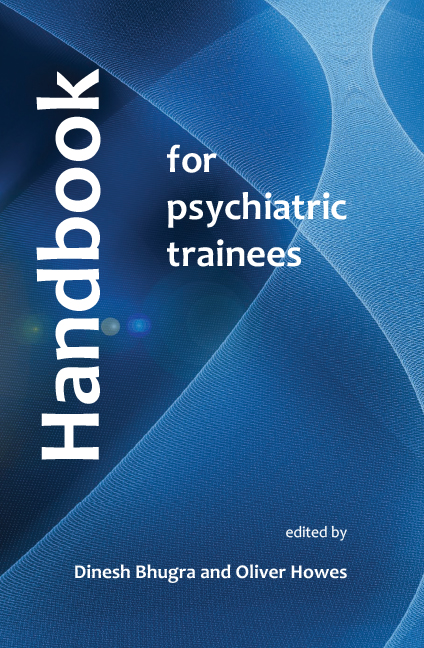Book contents
- Frontmatter
- Contents
- List of tables, boxes and figures
- List of contributors
- 1 Psychiatric training: the next steps
- Part 1
- Part 2
- Part 3
- 14 Personal safety
- 15 Managing violence
- 16 Managing difficult clinical situations
- 17 Understanding and managing stress
- 18 Managing time: the key to professional success
- 19 Negotiation skills
- 20 Presentation skills
- 21 Mental health review tribunals: reports and hearings
- 22 How to get published
- 23 Mental health informatics
- 24 Clinical governance
- 25 Lifelong learning and revalidation
- 26 Mentoring and shadowing
- 27 The MRCPsych examinations
- 28 Flexible training
- 29 UK training for overseas doctors and opportunities for UK doctors to train outside the EEC
- 30 Academic careers
- 31 Higher degrees
- Index
20 - Presentation skills
from Part 3
- Frontmatter
- Contents
- List of tables, boxes and figures
- List of contributors
- 1 Psychiatric training: the next steps
- Part 1
- Part 2
- Part 3
- 14 Personal safety
- 15 Managing violence
- 16 Managing difficult clinical situations
- 17 Understanding and managing stress
- 18 Managing time: the key to professional success
- 19 Negotiation skills
- 20 Presentation skills
- 21 Mental health review tribunals: reports and hearings
- 22 How to get published
- 23 Mental health informatics
- 24 Clinical governance
- 25 Lifelong learning and revalidation
- 26 Mentoring and shadowing
- 27 The MRCPsych examinations
- 28 Flexible training
- 29 UK training for overseas doctors and opportunities for UK doctors to train outside the EEC
- 30 Academic careers
- 31 Higher degrees
- Index
Summary
‘The whole art of teaching is only the art of awakening the natural curiosity of young minds for the purpose of satisfying it afterwards.’
(Anatole France, The Crime of Sylvestre Bonnard, 1881)Presentation is a performance. A successful performance depends on good communication between a presenter and an audience. Most professionals are required to give a presentation at one time or another. Some, for example teachers and doctors, are expected to do so more often than others. Doctors, through their essential duties of training future generations, giving and explaining information to their patients and educating the general public about health issues, need to exercise skills in presenting information in an easily understandable and digestible form. Some doctors are born teachers; others have to learn, develop and master these skills. Once acquired, at a more senior level these can be of use in negotiating and planning the development of new services and in procuring funding in order to implement change.
The basic guidelines set out below should not only help trainee doctors, who are expected to take part in weekly academic programmes involving case presentations and journal clubs: they should also be of use to newly appointed consultants, whose responsibilities include teaching a range of professional groups, such as nurses, occupational therapists, general practitioners and social workers.
The precise style, mode and content of a presentation will depend on the type of meeting, the needs of the audience and the number attending. In all cases, the presentation must be educational, thought-provoking and entertaining. The audience must be made to feel further curiosity about the subject by the end of the presentation; this is a task for the presenter. It will be no great challenge to one who has both a passion for the subject and good communication skills, but, even with these, delivering the same talk over and over again will make the task more difficult. It is essential to revise and update the material each time; there is always scope for improvement, as well as opportunities to incorporate new information. Remember also that communication is a two-way process; we often gain new ideas during the question and answer and discussion time, and we can ourselves learn through teaching others.
- Type
- Chapter
- Information
- Handbook for Psychiatric Trainees , pp. 187 - 194Publisher: Royal College of PsychiatristsPrint publication year: 2008



